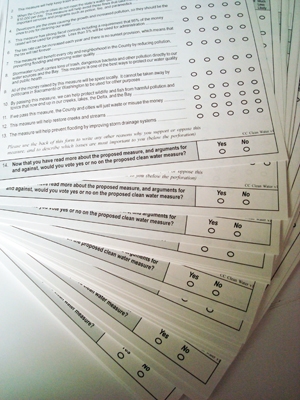Author: Susan Barnes
A well-crafted public opinion survey can provide you with a lot of information regarding the desires of your community, how they feel about your agency, and whether they are willing to support a proposed funding measure. This article will provide you with five things you will want to consider before you conduct a survey.
1. Determine What You Want to Find Out
First, try to narrow down the information you’re seeking to the top two or three pieces of information you want to get by conducting the survey. It’s best to keep it reasonably simple. If the survey is too long or complicated, you run the risk of people being unwilling to take the time to complete the entire survey. A short, focused survey has the best chance of providing your agency with accurate information from a representative sample of your community.
2. Know Your Audience
Clearly, you want to survey people in your agency’s jurisdiction. Beyond that, you need to consider who, specifically, you want to target with your survey. If you’re considering a funding measure, the type of measure will determine whether you need to survey only registered voters, or just property owners, or both. Also, consider whether you are interested in information from people with specific interests, such as park users or people who are retired. Reaching the right people with your survey will make all the difference in obtaining the information you need.
3. Decide What Survey Instrument You Want to Use
 Surveys conducted through the mail, those done online, and those done over the phone each have their pros and cons.
Surveys conducted through the mail, those done online, and those done over the phone each have their pros and cons.
Mailed surveys are great for reaching property owners, including those who may not live in your community. It’s also a great way to reach likely voters if you’re going to conduct a mailed ballot proceeding, and it won’t interrupt anyone in the middle of dinner.
Online surveys are convenient for many people, but not everyone has access to the internet. This method may work better for young, tech-savvy community members, but less well for elderly people. Also, if an online survey isn’t done the right way, you may not get a representative sample of respondents.
One benefit of online or phone surveys is they can provide you with more flexibility than a mailed survey. For instance, you can change which question you ask next based on the answer to the question before it. On the other hand, phone surveys need to catch people when they’re at home, so they tend to have a lower response rate than other methods, and they may not be the best way to reach the elderly or others with hearing difficulties.
4. Craft a Compelling Message
The first thing a community member will wonder when approached with a survey, regardless of the survey method, is “What is this about?” Be sure you have a clear, compelling message to let your community know a bit about your agency, why you are conducting the survey, and why their opinion is important to you. Otherwise, they may just hang up the phone or throw away the survey.
5. Be Prepared for the Next Steps
Many factors can cause people to change their opinions over time. Trends in the economy, foreign relations, and even the time of year can influence how people feel about things in your community. Therefore, the longer you wait to act on your survey results, the less valuable those results become. Before you conduct your survey, be prepared to take action on the results as soon as possible.
